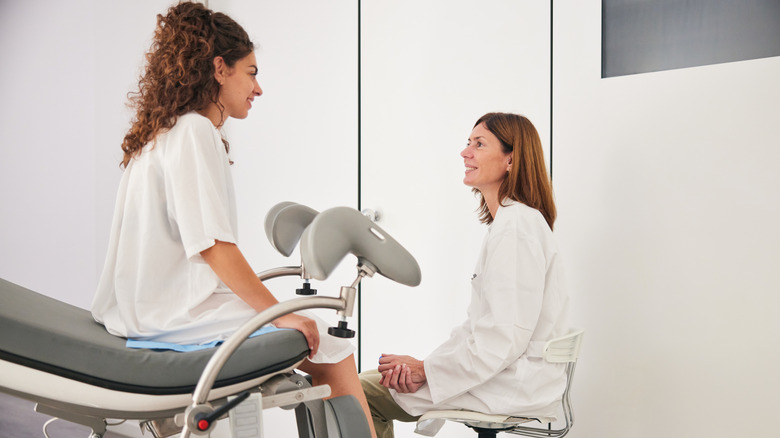Lori Harvey's PCOS And Endometriosis Journey Highlights How Difficult Receiving A Diagnosis Can Be
Since her teens, model and actress Lori Harvey had complained to her doctor about extremely painful periods and weight fluctuations. Although she felt something wasn't right with her body, Harvey told the SHE MD Podcast that her gynecologist insisted nothing was wrong. When she pushed back, her doctor referred her to Dr. Thaïs Aliabadi, also known as "Dr. A."
Dr. A (a co-host of the SHE MD Podcast) diagnosed her with both polycystic ovary syndrome (PCOS) and endometriosis, which explained periods so "excruciating" that Harvey sometimes wanted to go to the hospital. What her former doctor had brushed off as "normal" finally had a name, and Harvey said she was grateful to learn that her experience wasn't normal after all. On the podcast, Dr. A pointed out that many women have been told the same thing and, as a result, never received treatment for PCOS or endometriosis.
(Here are foods to eat and avoid if you have PCOS.)
Harvey said that because so many women like her and her mother grew up unaware of PCOS, they often suffered in silence for years. Gynecologists may not test for PCOS even when women describe symptoms. Painful periods can also signal endometriosis, another condition that deserves medical attention.
Signs of PCOS and endometriosis
According to the University of Rochester Medical Center, about 1 in 10 women deal with PCOS, which can cause symptoms such as irregular periods, excess facial hair, and acne. Despite the name, however, PCOS doesn't actually involve ovarian cysts. Instead, the condition is linked to an excess of follicles on the ovaries that affect hormone levels in the body. As a result, women with PCOS often have higher levels of the male hormone androgen, which can lead to acne, excess body and facial hair, or even male-pattern baldness. PCOS can also cause insulin resistance, which makes weight gain more likely.
Harvey said her weight would fluctuate dramatically, even when she dieted for weeks and exercised twice a day. If she reached her goal weight, she noticed it would shoot back up as soon as she took a vacation and indulged a little. As a teenager, she also struggled with acne and excess facial hair. Harvey now takes metformin to help control her blood sugar and weight.
Endometriosis may affect up to 10% of women, according to Johns Hopkins Medicine. Some common signs include painful menstrual cramps, painful sex, and heavy periods, but some women have silent endometriosis, which has no symptoms. Normally, endometrial tissue grows inside the uterus and is shed during a woman's menstrual cycle. With endometriosis, this tissue can grow around the fallopian tubes, the ovaries, or even on organs such as the rectum or bladder. As the tissue builds up and sticks together, it can cause painful cysts and scarring.

